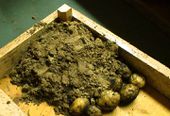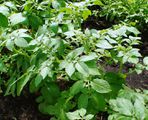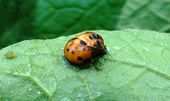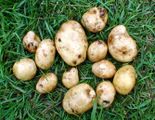Difference between revisions of "Potato"
From eagle-rock.org
| Line 1: | Line 1: | ||
[[File:Potato flower white.jpg|200px|thumb|right|]] | [[File:Potato flower white.jpg|200px|thumb|right|]] | ||
| − | + | ||
| + | == Chunks of information == | ||
* Today i finished planting potatoes. Our harvest of last year has all been eaten, so we're now eating potatoes bought in shops. The difference in taste is remarkable. Potatoes grow fast. In a few weeks they form big plants with many green leaves and these leaves, through the process of photosynthesis, make the potatoes grow. Potatoes contain a big percentage of starch. When potatoes grow on chemical fertilizers, they grow even faster. The tubers then taste like water. It's just starch without much taste. But potatoes grown on good compost that contains many trace minerals besides the ones given through chemical fertilizers have time to take in these minerals. They grow slower but become richer in content and taste and provide our bodies with what we need for good health. Something similar is the case for the milk we buy from cows. Many farmers feed their cows on ryegrass. This grass grows very fast on big amounts of chemical fertilizers and manure that comes from the cows who ate that grass. Because the grass grows so fast (a harvest of up to seven times in a summer is possible compared to two cuts of grass in the past), it cannot take in many minerals. The manure that comes from these cows is also depleted of especially trace minerals and other nutrients they would otherwise contain. In that way the cycle continues. Soils get poorer and poorer and so does the milk that we drink or the cheese made from this milk. Eventually it's our health that pays the price. | * Today i finished planting potatoes. Our harvest of last year has all been eaten, so we're now eating potatoes bought in shops. The difference in taste is remarkable. Potatoes grow fast. In a few weeks they form big plants with many green leaves and these leaves, through the process of photosynthesis, make the potatoes grow. Potatoes contain a big percentage of starch. When potatoes grow on chemical fertilizers, they grow even faster. The tubers then taste like water. It's just starch without much taste. But potatoes grown on good compost that contains many trace minerals besides the ones given through chemical fertilizers have time to take in these minerals. They grow slower but become richer in content and taste and provide our bodies with what we need for good health. Something similar is the case for the milk we buy from cows. Many farmers feed their cows on ryegrass. This grass grows very fast on big amounts of chemical fertilizers and manure that comes from the cows who ate that grass. Because the grass grows so fast (a harvest of up to seven times in a summer is possible compared to two cuts of grass in the past), it cannot take in many minerals. The manure that comes from these cows is also depleted of especially trace minerals and other nutrients they would otherwise contain. In that way the cycle continues. Soils get poorer and poorer and so does the milk that we drink or the cheese made from this milk. Eventually it's our health that pays the price. | ||
Revision as of 22:21, 20 April 2012
Chunks of information
- Today i finished planting potatoes. Our harvest of last year has all been eaten, so we're now eating potatoes bought in shops. The difference in taste is remarkable. Potatoes grow fast. In a few weeks they form big plants with many green leaves and these leaves, through the process of photosynthesis, make the potatoes grow. Potatoes contain a big percentage of starch. When potatoes grow on chemical fertilizers, they grow even faster. The tubers then taste like water. It's just starch without much taste. But potatoes grown on good compost that contains many trace minerals besides the ones given through chemical fertilizers have time to take in these minerals. They grow slower but become richer in content and taste and provide our bodies with what we need for good health. Something similar is the case for the milk we buy from cows. Many farmers feed their cows on ryegrass. This grass grows very fast on big amounts of chemical fertilizers and manure that comes from the cows who ate that grass. Because the grass grows so fast (a harvest of up to seven times in a summer is possible compared to two cuts of grass in the past), it cannot take in many minerals. The manure that comes from these cows is also depleted of especially trace minerals and other nutrients they would otherwise contain. In that way the cycle continues. Soils get poorer and poorer and so does the milk that we drink or the cheese made from this milk. Eventually it's our health that pays the price.
Gallery
Why weeding is important... The photo shows a field with potatoes. They're all from the same species but the front and outer potatoes in the field (they're placed in circles) were weeded and in the center ones not. See also Weed control
Larva of colorado potato beetle on potato leaf (see Pests & diseases)
See also
External links
- Potato Wikipedia







